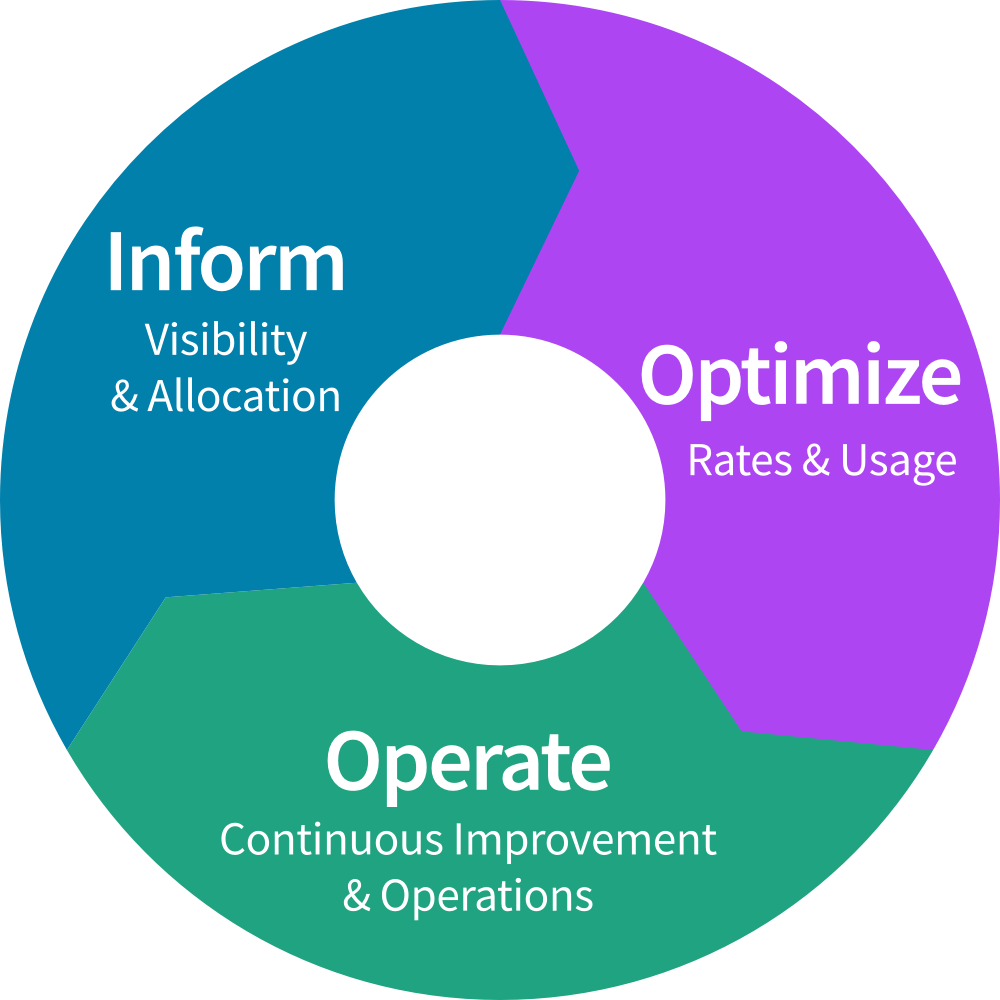FinOps
What is FinOps?
What is FinOps?
FinOps is a set of practices and principles that aim to optimize and manage the costs of cloud computing resources effectively. The word "FinOps" is a portmanteau of “Finance” and “DevOps,” stressing the communications and collaboration between business and technology teams. FinOps requires collaboration across finance, operations, and engineering to ensure that cloud spending is aligned with business goals. The practice of FinOps helps you gain better visibility into your cloud expenses, allocate costs to specific business units and outcomes, and make informed decisions about resource allocation and cost optimization.

Core components of FinOps practices
Core components of FinOps practices
- Cost visibility: Full visibility into cloud spending across different services, departments or projects is a crucial component to FinOps success. Complete visibility helps you identify baseline spend, cost trends, outliers and potential areas for optimization as practices mature
- Cost allocation: Allocating cloud costs to different business units, projects, and outcomes is necessary for accountability and resource optimization. It allows you to identify which teams are using resources, what business outcomes they’re achieving using these resources and identify the efficiency of spend related to outcomes
- Budgeting and forecasting: Setting budgets and forecasting future cloud expenses helps you plan your spending and allocate resources appropriately. It also enables you to identify cloud spend anomalies and take appropriate action once identified
- Resource optimization: FinOps emphasizes finding opportunities to optimize cloud resource usage and take advantage of cloud provider discounting models, which can include rightsizing instances, using reserved instances or spot instances, and automating scaling based on demand
- Collaboration: FinOps at its core is all about collaboration between various stakeholders, including finance, operations and engineering. This ensures cloud costs are managed holistically and aligned with your organization's overall objectives
- Tools and automation: To assist with the complex process of maturing FinOps practices and getting the most out of FinOps efforts, tools and platforms are available to help you manage, optimize and govern cloud costs. These tools provide insights, recommendations and automation to streamline the FinOps process
- Continuous improvement: FinOps is not a one-time effort but an ongoing process of monitoring, analyzing and optimizing cloud costs. Regular reviews and adjustments are essential to achieve sustained cost savings, utilizing automation and governance to scale results and get the most out of cloud spend
By adopting FinOps practices, you can achieve better cost control, make data-driven decisions and maximize the value you get from your cloud investments.
Source: FinOps Foundation
How does FinOps differ from traditional cost management?
How does FinOps differ from traditional cost management?
Unlike traditional fixed IT budgets, FinOps focuses on tackling the dynamic, real-time costs associated with cloud. It involves continuous monitoring, optimization and collaboration to adapt to changing resource needs and discounting models. FinOps involves a constant lifecycle to achieve iterative and continual improvements on cloud spend, as well as scale throughout the maturity of a FinOps practice.
Is FinOps relevant only for large enterprises, or can smaller businesses benefit as well?
Is FinOps relevant only for large enterprises, or can smaller businesses benefit as well?
FinOps principles are adaptable to organizations of all sizes, across all industries. Smaller businesses can benefit from cost savings and improved resource management, just like larger enterprises. Additionally, implementing FinOps practices early on can help achieve significant results as organizations grow with cloud cost management in mind.
What challenges can arise when implementing FinOps?
What challenges can arise when implementing FinOps?
As with implementing any new practice, there can be obstacles along the way. Challenges organizations can encounter when first implementing FinOps can include resistance to change, a lack of cost visibility, managing the complexity in multi-cloud environments and ensuring ongoing collaboration between teams. The FinOps foundation recommends taking a "crawl, walk, run” approach to implementation to ensure less shock to organizations first implementing practices and continual success.
Benefits of FinOps include:
- Improved cost visibility
- Accountability by business units and outcomes
- Efficient resource utilization
- Improved decision-making and forecasting/budgeting
- Scalable cloud spending and governance
- Ability to respond to changing business demands promptly
Additional resources:
- Discover more about FinOps
